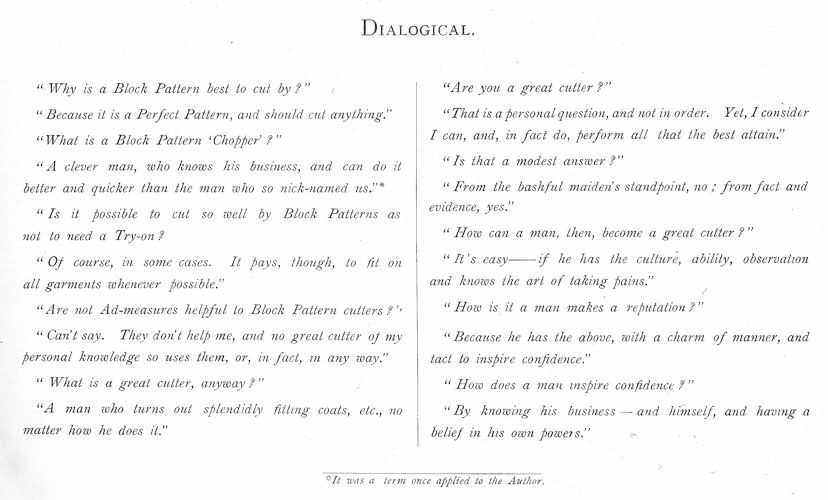Here is another example of the use of the distinction between "sack clothes" and "dress clothes":
Another necessity for the college man is the dinner coat. This may be either single or double-breasted, preferably double-breasted. This suit has many advantages. It is worn at fraternity dinners, smokers, theatre and many other evenings when a tail coat is too much and sack clothes are not enough.
Taken from:
http://thelondonlounge.net/gl/forum/vie ... php?t=6205
New Member
Sator,
My old boss was an Armenian from Turkey -- he still called the city Constantinople. You may recall that Ataturk borrowed from Western Europe in his quest to modernize Turkey. My boss did not have much respect for other tailors that he knew from that area; he called them "country tailors".
Interestingly I had to do my own research on cutting, as he did not use any books at all. Most of it was in his head, although he had a set of block patterns that he had drafted that he also referred to. As you may guess, I consider that a big weak spot in my knowledge.
We had competitors that cut clothing more along the sack coat lines, but we preferred to follow the body more. I can say that neither we nor our customers or competitors used the term "sack" or "lounge" coats. I was aware of the terms, of course. At that time, those distinctions seemed to have passed into history and we were just left with stylistic preferences as to cut, vs. distinct differences by formality and purpose.
I will see if I can get Chris Despos to weigh in here also. Although he is younger, he grew up in the business.
Cheers,
Joel
My old boss was an Armenian from Turkey -- he still called the city Constantinople. You may recall that Ataturk borrowed from Western Europe in his quest to modernize Turkey. My boss did not have much respect for other tailors that he knew from that area; he called them "country tailors".
Interestingly I had to do my own research on cutting, as he did not use any books at all. Most of it was in his head, although he had a set of block patterns that he had drafted that he also referred to. As you may guess, I consider that a big weak spot in my knowledge.
We had competitors that cut clothing more along the sack coat lines, but we preferred to follow the body more. I can say that neither we nor our customers or competitors used the term "sack" or "lounge" coats. I was aware of the terms, of course. At that time, those distinctions seemed to have passed into history and we were just left with stylistic preferences as to cut, vs. distinct differences by formality and purpose.
I will see if I can get Chris Despos to weigh in here also. Although he is younger, he grew up in the business.
Cheers,
Joel
It sounds like you were mostly drafting by pattern manipulation of block patterns.
Thank you for your insights. I enjoyed hearing about your recollections and anecdotes.
Thank you for your insights. I enjoyed hearing about your recollections and anecdotes.
Sator,
I was not doing any drafting for him. My boss generally made measurements and then drew right on the cloth without a pattern. For difficult cases, he drew patterns on paper and checked them against his masters.
Cheers,
Joel
I was not doing any drafting for him. My boss generally made measurements and then drew right on the cloth without a pattern. For difficult cases, he drew patterns on paper and checked them against his masters.
Cheers,
Joel
The tailor I go to also drafts directly onto the cloth in this manner.
It sounds like cutters like these draft like T. H. Holding - aka Mr Chopper - except with the graded block patterns kept in their heads.

It sounds like cutters like these draft like T. H. Holding - aka Mr Chopper - except with the graded block patterns kept in their heads.

Last edited by Sator on Thu Feb 12, 2009 3:52 am, edited 1 time in total.
That makes sense, Sator.
Joel
Joel
I like the above interview, Sator. My tailor also draws directly on cloth. Since fitting is, in my opinion, an essential step in bespoke tailoring, I see no problem with this manner of cutting. At any rate, with established customers these fittings are more safety checks and styling sessions, as otherwise few if any changes are made to the garment.
-
- Information
-
Who is online
Users browsing this forum: No registered users and 84 guests
